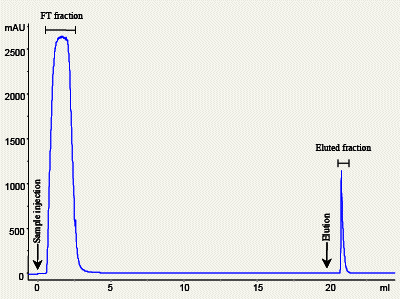Anti-Insulin Affibody® Molecule (ab31906)
Overview
-
Product name
Anti-Insulin Affibody® Molecule -
Specificity
ab31906 recognises insulin. -
Tested applications
Suitable for: IHC-Fr, IHC-Pmore details -
Species reactivity
Reacts with: Mouse, Rat, Human -
Immunogen
Other Immunogen Type corresponding to Insulin.
-
General notes
ab31906 is a recombinant protein produced in E. coli.
What are Affibody Molecules?
Affibody® affinity ligands are small, simple proteins composed of a three-helix bundle based on the scaffold of one of the IgG-binding domains of Protein A. Protein A is a surface protein from the bacterium Staphylococcus aureus. This scaffold has excellent features as an affinity ligand and can be designed to bind with high affinity to any given target protein. The domain consists of 58 amino acids, 13 of which are randomized to generate Affibody® libraries with a large number of ligand variants. Thus, the libraries consist of a multitude of protein ligands with an identical backbone and variable surface- binding properties. The current Affibody® libraries contains billions of variants. In function, Affibody® molecules mimic antibodies, nature’s own binders to an infinite number of antigens. Compared to antibodies, the most striking dissimilarity of Affibody® molecules is the small size. Affibody® molecules have a molecular weight of 14 kDa, compared to the molecular weight of antibodies, which is 150 kDa. In spite of its small size, the binding site of Affibody® molecules is similar to that of an antibody. The advantages of Affibody® molecules over antibodies are · their small size · the simple structure of the molecules · its robust physical properties · its ability to fold correctly intracellularly · the fast and cost-efficient production in bacteria · the possibility to produce Affibody® molecules through chemical synthesis · the possibility to couple Affibody® molecules in multimeric constructs.This Anti-Insulin Affibody® Molecule is modified with a unique C-terminal cysteine for directed single-point chemical modification, facilitating labelling with fluorescent dyes, biotin or coupling to matrices. However, tail-to-tail dimers are spontaneously generated via a disulphide bridge between the C-terminal cysteines. Prior to coupling via the C-terminal the Affibody® Molecule needs to be reduced to expose the reactive cysteine residue. Recommended reducing condition is 20mM DTT at a pH above 7.5 and incubation at room temperature for 2 hours. Remove excess DTT by passage through a desalting column, not by dialysis. Not yet tested in other applications. Optimal dilutions/concentrations should be determined by the end user.
THIS AFFIBODY® MOLECULE REQUIRES CONJUGATION TO A SUITABLE LABEL BEFORE USE. PLEASE REFER TO THE "PROTOCOLS" LINK BELOW.
Properties
-
Form
Liquid -
Storage instructions
Shipped at 4°C. Store at +4°C short term (1-2 weeks). Upon delivery aliquot. Store at -20°C long term. -
Storage buffer
pH: 7.40
Constituent: 0.079% Ammonium bicarbonate -
 Concentration information loading...
Concentration information loading... -
Purification notes
ab31906 is >98% pure, as determined by SDS-PAGE (Coomassie blue staining) and RP-HPLC analysis. -
Research areas
-
Function
Insulin decreases blood glucose concentration. It increases cell permeability to monosaccharides, amino acids and fatty acids. It accelerates glycolysis, the pentose phosphate cycle, and glycogen synthesis in liver. -
Involvement in disease
Defects in INS are the cause of familial hyperproinsulinemia (FHPRI) [MIM:176730].
Defects in INS are a cause of diabetes mellitus insulin-dependent type 2 (IDDM2) [MIM:125852]. IDDM2 is a multifactorial disorder of glucose homeostasis that is characterized by susceptibility to ketoacidosis in the absence of insulin therapy. Clinical fetaures are polydipsia, polyphagia and polyuria which result from hyperglycemia-induced osmotic diuresis and secondary thirst. These derangements result in long-term complications that affect the eyes, kidneys, nerves, and blood vessels.
Defects in INS are a cause of diabetes mellitus permanent neonatal (PNDM) [MIM:606176]. PNDM is a rare form of diabetes distinct from childhood-onset autoimmune diabetes mellitus type 1. It is characterized by insulin-requiring hyperglycemia that is diagnosed within the first months of life. Permanent neonatal diabetes requires lifelong therapy.
Defects in INS are a cause of maturity-onset diabetes of the young type 10 (MODY10) [MIM:613370]. MODY10 is a form of diabetes that is characterized by an autosomal dominant mode of inheritance, onset in childhood or early adulthood (usually before 25 years of age), a primary defect in insulin secretion and frequent insulin-independence at the beginning of the disease. -
Sequence similarities
Belongs to the insulin family. -
Cellular localization
Secreted. - Information by UniProt
-
Alternative names
- IDDM
- IDDM1
- IDDM2
see all -
Database links
- Entrez Gene: 3630 Human
- Entrez Gene: 16333 Mouse
- Entrez Gene: 24505 Rat
- Omim: 176730 Human
- SwissProt: P01308 Human
- SwissProt: P01325 Mouse
- SwissProt: P01322 Rat
- Unigene: 272259 Human
Images
-
To demonstrate the binding capacity and specificity of the Anti-Insulin Affibody® molecule, 1.5 ml of five times diluted human serum spiked with insulin was injected on a column with 0.4 ml SulfoLink® Coupling gel with immobilized Anti-Insulin Affibody® molecule.
To demonstrate the binding capacity and specificity of the Anti-Insulin Affibody® molecule, 1.5 ml of five times diluted human serum spiked with insulin was injected on a column with 0.4 ml SulfoLink® Coupling gel with immobilized Anti-Insulin Affibody® molecule. -
Eluted and flow-through fractions were analyzed by an SDS-PAGE analysis:
Lane 1: human serum spiked with insulin
Lane 2: flowthrough fraction
Lane 3: eluted fraction
Lane 4: human insulin standard
Eluted and flow-through fractions were analyzed by an SDS-PAGE analysis:
Lane 1: human serum spiked with insulin
Lane 2: flowthrough fraction
Lane 3: eluted fraction
Lane 4: human insulin standard
















